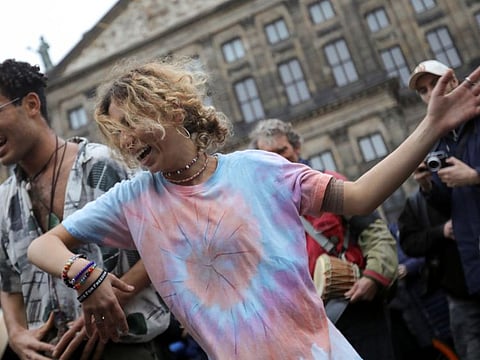Dutch ‘Bible Belt’ targeted in COVID-19 vaccine drive
Urk was ‘ground zero’ for Netherlands’ worst riots in decades which erupted over curfew

Urk, Netherlands: From his surgery in the remote Dutch fishing village of Urk, family doctor Wilco Bloed is trying to win over coronavirus vaccine hold-outs who believe that God is on their side.
Only around one-third of people have been jabbed in this community deep in the conservative Protestant “Bible Belt” region, fewer than anywhere else in the Netherlands.
But with COVID-19 cases soaring nationwide, doctors in Urk have started their own vaccination campaign to reach out and convince people to get the shot.
“We started the initiative because Urk is the place in the Netherlands with the lowest vaccination rate, under 30 per cent, and because the contaminations were really going up,” Bloed told AFP.
“So as family doctors we have decided to offer vaccinations in the practices (instead of vaccination centres).”
It will “offer a possibility to have a conversation (with a trusted person) and remove barriers, and to get the vaccination rate up”, he added.
Rates have since risen to 35 per cent since the scheme started at the beginning of November, but that is still far below the national adult vaccination rate of 84.7 percent.
“The aversion to vaccination was quite large... it is true that people in Urk can be quite stubborn,” said the doctor, who moved to the village 15 years ago.
Urk was “ground zero” for the Netherlands’ worst riots in decades, which erupted in January over a COVID-19 curfew.
Since then the village has seen scuffles with journalists outside churches that held services during lockdown, and a small outbreak of unrest on Saturday night as fresh rioting gripped the country.
The village with its picture-postcard harbour and fishermen’s cottages was an island until 70 years ago when it was joined to the Dutch mainland by a land reclamation project, and it maintains its isolated mentality.
“If the rest of the Netherlands does one thing, Urk does the other,” said Jacob, a 21 year old from Urk fishing on the harbour with his friend, who did not want to give his full name.
Urk has above all retained the strict Calvinist beliefs of the so-called Bible Belt that stretches through the heart of the Netherlands.
The church’s beliefs on vaccination too have long been a key factor in low uptake rates for all kinds of jabs, with a measles outbreak in Urk two years ago.
Vaccination is seen by some as intervening in God’s will, but the issue is complex, says Reverend Alwin Uitslag, of the Christian Reformed Eben-Haezerkerk church in Urk.
“On the one hand the Bible says that you can take precautions. So you may prepare for certain crisis,” such as coronavirus, Uitslag told AFP.
“Another part says vaccinating is not allowed because you intervene in God’s providence.”
Not just religion
He described his church as “strict”, with rules that also include two church services on Sundays, on which shops are closed and people may not go to work.
Women are required to wear dresses and to put on headscarves for worship.
But when it comes to Covid-19 vaccines, the final choice was left to people’s “individual conscience”, said the pastor.
“It is my job to give good information to the church members, it’s not my job to give them direction to do it or not to do it,” he said, without revealing whether he had been jabbed.
In this village where science and religion collide, doctors and pastors say they have been talking to try to find the best way forward.
Religion was however “actually a very small part” of the problem, said Bloed.
Instead it was “largely fear of side effects”, coupled with Urk’s isolation from the government in The Hague, disinformation, and a young population that is more likely to be resistant to vaccination.
The results of the campaign, being carried out with the Dutch GGD health authority and local municipality, have so far been encouraging although there is far to go.
“In the first week and a half, the same number of injections was given as the GGD did four weeks before, though we see it slow down a bit,” said Bloed.
But the doctor, who is also a member of the village’s Reformed churches, said he kept his own religious beliefs out of things.
“Look I’m also Christian. And yes you don’t have to agree on everything,” he said.
Sign up for the Daily Briefing
Get the latest news and updates straight to your inbox







